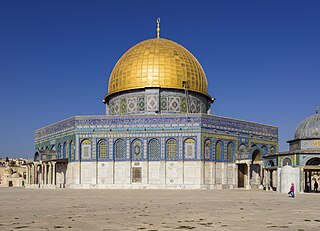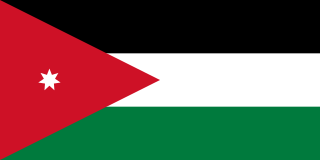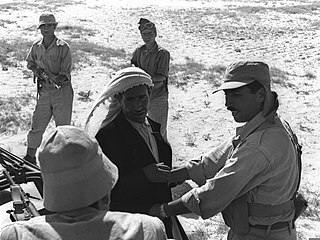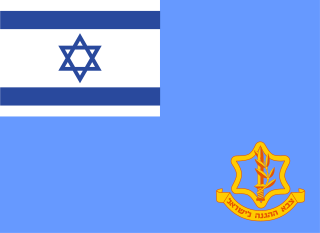Related Research Articles

The Palestine Liberation Organization is a Palestinian nationalist political and militant organization founded in 1964 with the initial purpose of establishing Arab unity and statehood over the territory of former Mandatory Palestine, in opposition to the State of Israel. In 1993, alongside the Oslo I Accord, the PLO's aspiration for Arab statehood was revised to be specifically for the Palestinian territories under an Israeli occupation since the 1967 Arab–Israeli War.

The Israeli–Palestinian conflict is one of the world's most enduring conflicts, beginning in the mid-20th century. Various attempts have been made to resolve the conflict as part of the Israeli–Palestinian peace process, alongside other efforts to resolve the broader Arab–Israeli conflict. Public declarations of claims to a Jewish homeland in Palestine, including the First Zionist Congress of 1897 and the Balfour Declaration of 1917, created early tensions in the region. Following World War I, the Mandate for Palestine included a binding obligation for the "establishment in Palestine of a national home for the Jewish people". Tensions grew into open sectarian conflict between Jews and Arabs. The 1947 United Nations Partition Plan for Palestine was never implemented and provoked the 1947–1949 Palestine War. The current Israeli-Palestinian status quo began following Israeli military occupation of the Palestinian territories in the 1967 Six-Day War.

The history of the State of Palestine describes the creation and evolution of the State of Palestine in the West Bank and Gaza Strip.

The First Intifada or First Palestinian Intifada, also known simply as the intifada or the intifadah, was a sustained series of protests and violent riots carried out by Palestinians in the Palestinian Territories and Israel. It was motivated by collective Palestinian frustration over Israel's military occupation of the West Bank and the Gaza Strip, as it approached a twenty-year mark, having begun after Israel's victory in the 1967 Arab–Israeli War. The uprising lasted from December 1987 until the Madrid Conference of 1991, though some date its conclusion to 1993, with the signing of the Oslo Accords.

The Camp David Accords were a pair of political agreements signed by Egyptian President Anwar Sadat and Israeli Prime Minister Menachem Begin on 17 September 1978, following twelve days of secret negotiations at Camp David, the country retreat of the President of the United States in Maryland. The two framework agreements were signed at the White House and were witnessed by President Jimmy Carter. The second of these frameworks led directly to the 1979 Egypt–Israel peace treaty. Due to the agreement, Sadat and Begin received the shared 1978 Nobel Peace Prize. The first framework, which dealt with the Palestinian territories, was written without participation of the Palestinians and was condemned by the United Nations.

The Jordanian annexation of the West Bank formally occurred on 24 April 1950, after the 1948 Arab–Israeli War, during which Transjordan occupied territory that had previously been part of Mandatory Palestine and had been earmarked by the UN General Assembly Resolution 181 of 29 November 1947 for an independent Arab state to be established there alongside a Jewish state mainly to its west. The annexation tripled the population of Transjordan, from 400,000 to 1,300,000.

Efraim Karsh is an Israeli–British historian who is the founding director and emeritus professor of Middle East and Mediterranean Studies at King's College London. Since 2013, he has served as professor of political studies at Bar-Ilan University. He is also a principal research fellow and former director of the Middle East Forum, a Philadelphia-based think tank. He is a vocal critic of the New Historians, a group of Israeli scholars who have questioned the traditional Israeli narrative of the Arab–Israeli conflict.
The Green Line, (pre-)1967 border, or 1949 Armistice border, is the demarcation line set out in the 1949 Armistice Agreements between the armies of Israel and those of its neighbors after the 1948 Arab–Israeli War. It served as the de facto borders of the State of Israel from 1949 until the Six-Day War in 1967.

The Palestine Liberation Army is ostensibly the military wing of the Palestine Liberation Organization (PLO), set up at the 1964 Arab League summit held in Alexandria, Egypt, with the mission of fighting Israel. However, it has never been under effective PLO control, but rather it has been controlled by its various host governments, usually Syria. Even though it initially operated in several countries, the present-day PLA is only active in Syria and recruits male Palestinian refugees.
The Arab–Israeli conflict began in the 20th century, evolving from earlier Intercommunal violence in Mandatory Palestine. The conflict became a major international issue with the birth of Israel in 1948. The Arab–Israeli conflict has resulted in at least five major wars and a number of minor conflicts. It has also been the source of two major Palestinian uprisings (intifadas).

Palestinian return to Israel refers to the movement of Palestinians back into the territory of present Israel.

The Arab–Israeli conflict is an ongoing intercommunal phenomenon involving political tension, military conflicts, and other disputes between Arab countries and Israel, which escalated during the 20th century, but had mostly faded out by the early 21st century. The roots of the Arab–Israeli conflict have been attributed to the support by Arab League member countries for the Palestinians, a fellow League member, in the ongoing Israeli–Palestinian conflict; this in turn has been attributed to the simultaneous rise of Zionism and Arab nationalism towards the end of the 19th century, though the two national movements had not clashed until the 1920s.

Riyad al-Maliki is former Minister of Information, government spokesperson, and Foreign Affairs Minister of the Palestinian National Authority in its 12th government, and resumed office as Foreign Affairs Minister in the current 13th government.
The Begin–Sadat Center for Strategic Studies is an Israeli think tank affiliated with Bar-Ilan University and supported by the NATO Mediterranean Initiative, conducting policy-relevant research on Middle Eastern and global strategic affairs, particularly as they relate to the national security and foreign policy of Israel and regional peace and stability. The center's mission is to contribute to promoting peace and security in the Middle East, through policy-oriented researches on national security in the Middle East. It is located at the Social Sciences Faculty of Bar-Ilan University. The center was founded by Thomas Hecht, a Canadian-Jewish leader, and was dedicated to Menachem Begin and Anwar Sadat, who signed the Egypt–Israel peace treaty, the first peace agreement ever signed between Israel and an Arab country.

Palestinian fedayeen are militants or guerrillas of a nationalist orientation from among the Palestinian people. Most Palestinians consider the fedayeen to be "freedom fighters", while most Israelis consider them to be "terrorists".

The Israeli Military Governorate was a military governance system established following the Six-Day War in June 1967, in order to govern the civilian population of the West Bank, the Gaza Strip, the Sinai Peninsula and the Western part of Golan Heights. The governance was based on the Fourth Geneva Convention, which provides guidelines for military rule in occupied areas. East Jerusalem was the only exception from this order, and it was added to Jerusalem municipal area as early as 1967, and extending Israeli law to the area effectively annexing it in 1980. During this period, the UN and many sources referred to the military governed areas as Occupied Arab Territories.

The 1948 Palestine war was fought in the territory of what had been, at the start of the war, British-ruled Mandatory Palestine. It is known in Israel as the War of Independence and in Arabic as a central component of the Nakba. It is the first war of the Israeli–Palestinian conflict and the broader Arab–Israeli conflict. During the war, the British terminated the Mandate and withdrew, ending a period of rule which began in 1917, during the First World War. Beforehand, the area had been part of the Ottoman Empire. In May 1948, the State of Israel was established by the Jewish Yishuv, its creation having been declared on the last day of the Mandate. During the war, around 700,000 Palestinian Arabs were displaced.

Palestinian nationalism is the national movement of the Palestinian people that espouses self-determination and sovereignty over the region of Palestine. Originally formed in opposition to Zionism, Palestinian nationalism later internationalized and attached itself to other ideologies; it has thus rejected the occupation of the Palestinian territories by the government of Israel since the 1967 Six-Day War. Palestinian nationalists often drawn upon broader political traditions in their ideology, examples being Arab socialism and ethnic nationalism in the context of Muslim religious nationalism. Related beliefs have shaped the government of Palestine and continue to do so.

The All-Palestine Protectorate, or simply All-Palestine, also known as Gaza Protectorate and Gaza Strip, was a short-lived client state with limited recognition, corresponding to the area of the modern Gaza Strip, that was established in the area captured by the Kingdom of Egypt during the 1948 Arab-Israeli War and allowed to run as a protectorate under the All-Palestine Government. The Protectorate was declared on 22 September 1948 in Gaza City, and the All-Palestine Government was formed. The Prime Minister of the Gaza-seated administration was Ahmed Hilmi Pasha and the President was Hajj Amin al-Husseini, former chairman of the Arab Higher Committee. In December 1948, just three months after the declaration, the All-Palestine Government was relocated to Cairo and was never allowed to return to Gaza, making it a government in exile. With further resolution of the Arab League to put the Gaza Strip under the official protectorate of Egypt in 1952, the All-Palestine Government was gradually stripped of authority. In 1953, the government was nominally dissolved, though the Palestinian Prime Minister Hilmi continued to attend Arab League meetings on its behalf. In 1959, the protectorate was de jure merged into the United Arab Republic, while de facto turning Gaza into military occupation area of Egypt.
References
- ↑ "Faculty page". biu.edu. Bar Ilan University . Retrieved 21 October 2015.
- ↑ "FacultyPage". besacenter.org/. Begin–Sadat Center for Strategic Studies. Retrieved 21 October 2015.
- ↑ "Hillel Frisch". Emory.edu. Emory University.
- ↑ Romirowsky, Asaf (Fall 2009). "The Palestinian Military: Between Militias and Armies (book review)". Middle East Quarterly.
- ↑ Smith, Charles D. (October 2009). "The Palestinian Military: Between Militias and Armies (book review)". The Journal of Military History . 73 (4): 1368. doi:10.1353/jmh.0.0398. S2CID 159556287.
- ↑ L. Carl Brown (March 1999). "Countdown to Statehood: Palestinian State Formation in the West Bank and Gaza (book review)". Foreign Affairs .
- ↑ Gerner, Deborah J. (May 2001). "Countdown to Statehood: Palestinian State Formation in the West Bank and Gaza (book review)". International Journal of Middle East Studies . 33 (2): 329. doi:10.1017/S0020743801412062. JSTOR 259586. S2CID 153593224.